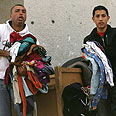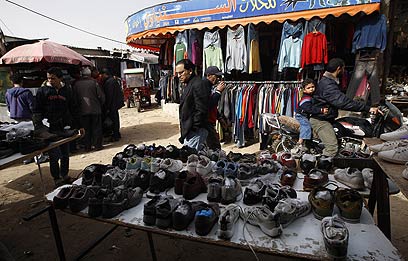
On a stage in the center of the market, the auctioneer opens the bidding with the best items sale: Leather jackets that attract a flurry of competition among the Palestinians gathered around looking for a deal.
The cheap second-hand clothes are a boon for the poorest residents in Gaza, where the flow of imports is restricted by Israeli regulations, and where UN figures show unemployment stands at 45.5%.
"I can't buy new clothes for myself and my children, so I come here every week to buy what they need most," says Jamal Malka.
The 55-year-old came away from the auction with several items of children's clothing he picked up for just NIS 4 ($1).
But Malka, who worked in Israel before entry restrictions were tightened, grumbles that the auction format gives potential buyers virtually no time to inspect the goods up close before bidding starts.
"Buying here depends on luck. Sometimes you get something fairly new, and other times it is totally worn out. But either way, it is better than nothing."
Israel first imposed a blockade on Gaza in June 2006 after militants there captured Israeli soldier Gilad Shalit. A year later, the measure was tightened after Hamas seized power in the enclave, ousting its moderate rivals.
In July 2010, Israel eased the restrictions in response to mounting international pressure over its deadly raid on a flotilla of aid ships trying to breach the blockade on May 31.
'Second-hand clothes humiliating'
Although Gaza is now receiving more goods from Israel, the market for cheap, second-hand clothing hasn't disappeared with outlets visible across the Gaza Strip.
In Firas market, a woman who gives her name only as Fidaa is buying everything she needs for her wedding next month.
"My wedding day is approaching but the dowry is small because my fiancé is out of work, so I decided to come here to buy what I need because the prices are cheaper," she told AFP.
So far, she has managed to find several plastic bags worth of clothes.
"All of this for less than NIS 100 ($25)," she says. "You couldn't get one piece of new Israeli clothing for that."

'Buying here depends on luck.' Yarmuk market (AFP)
Fidaa is happy with her haul, but embarrassed to reveal where she got it.
"I won't tell my husband's family that I bought clothes from the second-hand market," she says timidly. "It's humiliating, and they would lose respect for me."
But not everyone is quite so coy. And the fact that the clothes were once worn by Israelis doesn't seem to be an issue.
"I don't care that the clothes are Israeli," Malka told AFP. "People in Gaza buy new clothes that are Israeli, and even Israeli chocolate and crisps because they prefer them.
"I buy these clothes because they are cheap and I can't afford new clothes for my children."
30 tons of Israeli clothes each week
An item of used clothing here goes for anywhere between NIS 5-15 (up to $4), depending on the quality and sometimes the brand of the piece.
"Lots of people come here for second-hand clothes because they are suitable for the poor and the unemployed, the numbers of which are increasing everyday," says Mohamed Sendowy, a used clothes vendor.
"Before the embargo, I sold second-hand clothes to customers who were looking for certain brand names, but the number of customers has gone up enormously since the blockade because more people are unemployed or poor."
Sendowy brings in 30 tons of Israeli clothes each week, displaying them in stores he owns which specialize in clothes for men, women and children.
Umm Jamal holds up some of the second-hand items against her children, trying to see whether they might fit.
"I have five sons and four daughters – where am I going to buy them new clothes from?" she asks. "My husband's salary is barely enough for us to eat."
But her 12-year-old daughter Tamam is less than impressed by the clothes.
"Everyone buys new clothes, I would feel embarrassed if any of my friends knew that I wear used clothing.
"I know that my dad doesn't have the money to buy us new clothes, but that doesn't change the fact that I have to wear second-hand clothes, even on holidays and special occasions," she says unhappily.
Her mother looks at her with a disappointed glance.
"You should say 'Thank God'," she chides. "God willing I'll buy you new clothes when our situation improves."
- Follow Ynetnews on Facebook















